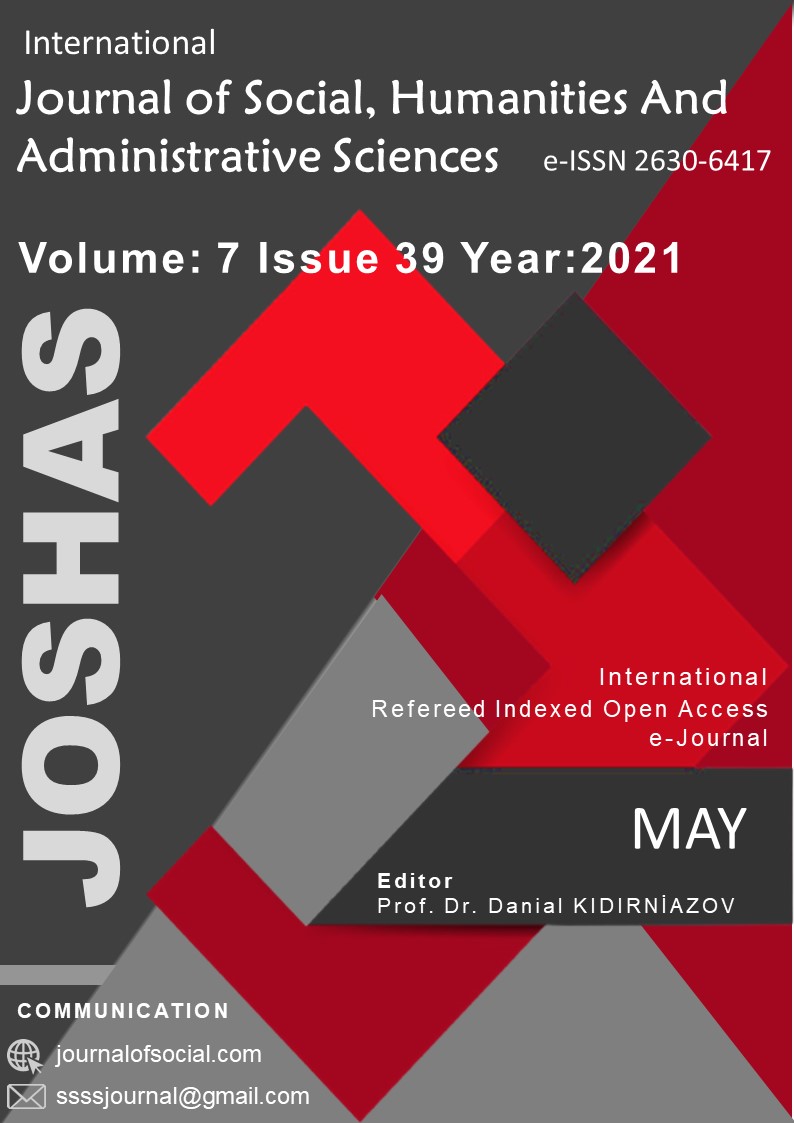Author :
Abstract
Bu çalışmanın temel amacı; Türk toplumunda COVID-19 sürecinde stres düzeyi ve hijyen kurallarına uyma arasındaki ilişkiyi gözlemlemektir. Araştırma verileri, 384 kişiye “sosyo demografik özellikler anketi”, “hijyeni etkilediği düşünülen faktörler” ve “Beck Depresyon Ölçeği (BDÖ)” uygulanarak toplanmıştır. Araştırma örnekleminin yaş ortalaması 33.2, BDÖ puan ortalaması ise 9.6 olarak bulunmuştur. Yapılan araştırmanın sonucu olarak, katılımcıların %63.1’inde normal, %21.8'inde hafif, %12.9’unda orta ve %2.2'inde şiddetli düzeyde depresyon bulunmuştur. Gün içerisinde el yıkama sıklığı 8 ve üzeri olan katılımcıların BDÖ puan ortalaması (10.87± 0.505) puan olup, el yıkama sıklığının 5 ve 7 kez olduğunu belirten katılımcıların puan ortalamasında (6.47±0.642) anlamlı düzeyde yüksek BDÖ puan ortalamasına sahip olduğu bulunmuştur.
Keywords
Abstract
The aim of this study was to investigate the relationship between stress level and compliance with hygiene rules in Turkish society within the COVID-19 process. Data was collected from 384 people through “sociodemographic attributes survey”, “factors that are considered to affect hygiene” and “Beck Depression Inventory (BDI)”. The mean age of the participants was 32.2; the mean points of the BDI was found 9.6. The results shown that 63.1 % of the participants were found to be normal, 21.8 % of them were mild, 12.9 % of them were moderate and 2.2 % of them had severe depression. The mean of BDI score of the participants with hand washing frequency of 8 or more during the day is 10.87 ± 0.505. It was found that the mean score (6.47 ± 0.642) of the participants, who stated that the hand washing frequency was 5 and 7 times, had a significantly higher BDI score mean
Keywords
- Beck, A.T., Steer, R.A., & Brown, G.K. (1996). Beck. Manual for the Beck Depression Inventory-II. San
- Beck, A.T., Steer, R.A., & Brown, G.K. (1996). Beck. Manual for the Beck Depression Inventory-II. San Antonio, TX: Psychological Corporation.
- Gao, J., Zheng, P., Jia, Y., Chen, H., Mao, Y., Chen, S., Wang, Y., Fu, H., and Dai, J. (2020). Mental HealthProblems and Social Media Exposure During COVID-19 Outbreak. http://dx.doi.org/10.2139/ssrn.3541120
- Gargarigiller, A. (2019). Sağlık Kurumlarında Altı Sigma ve Bir Model Yaklaşımı. International Social Mentality and Researcher Thinkers Journal http://dx.doi.org/10.31576/smryj.372
- Kelly, H. (2011), Bull World Health Organ 2011; 89:540–541. doi:10.2471/BLT.11.088815.
- Kırman, F. (2020). Sosyal Medyada Salgın Psikolojisi: Algı, Etki ve Başa Çıkma. Dünya İnsan Bilimleri Dergisi, 2020(2), 11-44.
- Otto, M.W., Calkins, A.W. and Hearon, B.A. (2010). Anxiety. In The Corsini Encyclopedia of Psychology (eds I.B. Weiner and W.E. Craighead). https: //doi. org/10.1002/978047 0479216.corpsy0073.
- Xiang, Y. T., Yang, Y., Li, W., Zhang, L., Zhang, Q., Cheung, T., & Ng, C. H. (2020). Timely mental healthcare for the 2019 novel coronavirus outbreak is urgently needed. The lancet. Psychiatry, 7(3), 228–229. https://doi.org/10.1016/S2 215-0366(20)30046-8.





